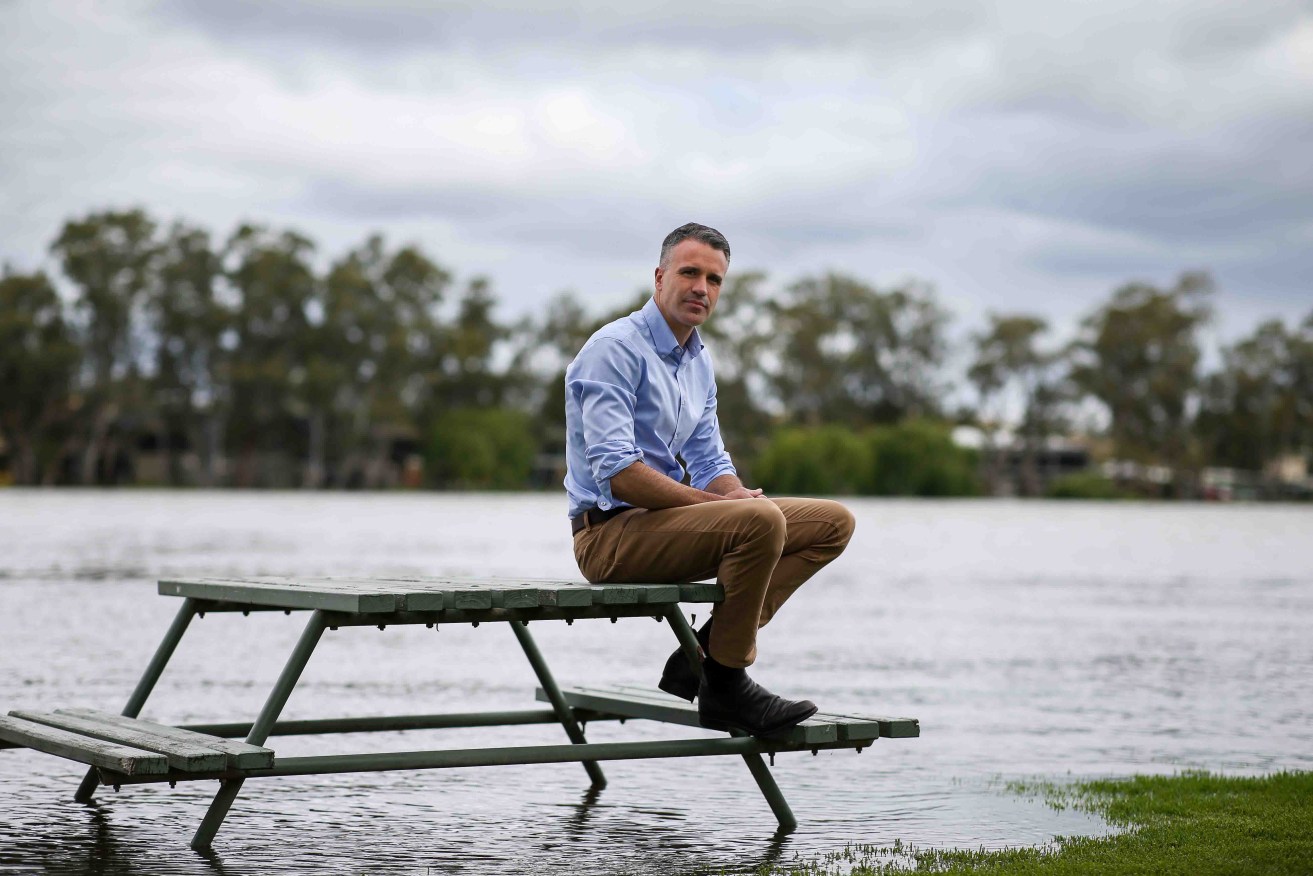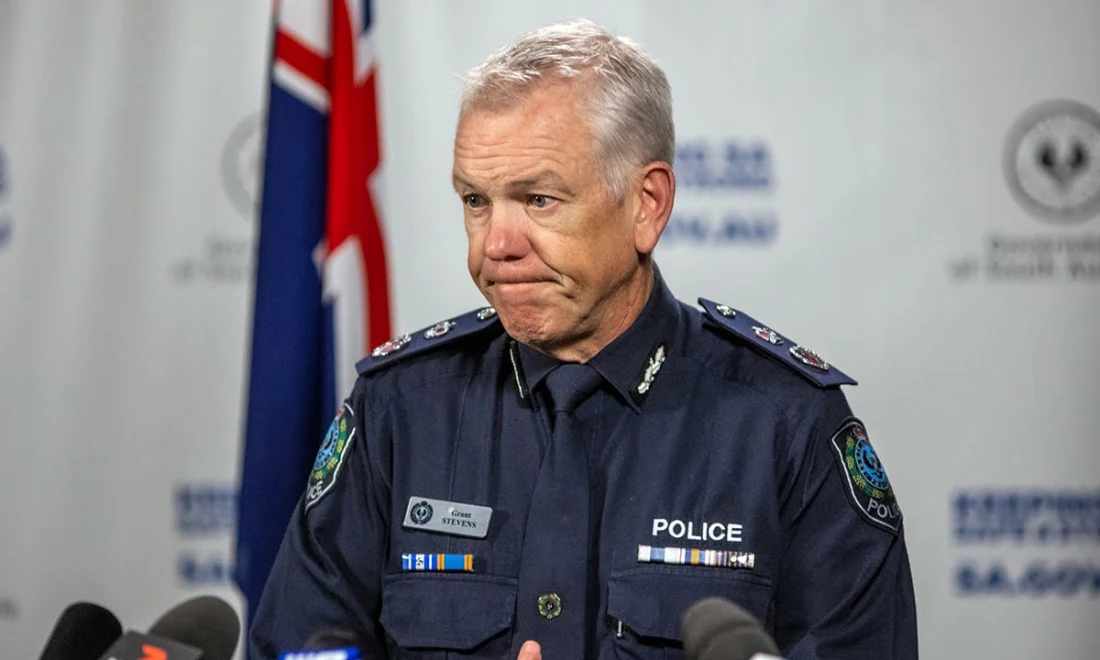Latest crisis leads SA’s politicians into familiar waters
Peter Malinauskas has learned some lessons from his predecessor’s approach to a statewide emergency, but some things haven’t changed, argues Matthew Abraham.


Premier Peter Malinauskas at Mannum this week. Photo: AAP/Matt Turner
He’s b-a-a-a-a-ck.
Just when we thought Big Santa had things under control, the Big Cop is back running the joint.
On Monday morning, Police Commissioner Grant Stevens climbed into what has become a well-worn saddle – effectively appointing himself to take control of South Australian lives, for our own good, for the duration.
Will he get the band back together? Will he team up with SA’s chief medical officer Professor Nicola Spurrier, for a greatest hits reunion tour?
This time it’s not a “sneaky” virus threatening the community – in fact, COVID-19 hasn’t stopped making us sick and claiming lives. We’re just pretending it’s gone away.
The threat now is simple, old-fashioned and familiar – water. Too much water. More water than you can poke a soggy stick at. The River Murray is in flood and nobody really knows for sure how high the water will rise when the full flows reach SA’s river communities, just in time for Christmas. The best, informed guesstimates are dire.
But the return of our benevolent dictator – an astute and highly-regarded overlord – is a reminder that despite the two long years of the COVID assault on our freedoms, South Australia’s emergency powers still haven’t been fixed. And they need fixing.

Police Commissioner Grant Stevens is back in charge of another statewide emergency. Photo: Tony Lewis/InDaily
Here’s how it works.
A meeting of the Emergency Management Committee of the Malinauskas Cabinet on Monday received “additional advice in respect of elevated water flows down the River Murray”.
This advice wasn’t pretty.
Not only did it show flows ranging from a likely 175 gigalitres to maybe 220 gigalitres a day by early December, but the “real possibility of a secondary flood peak in late December or early January”.
Given the risk to all who live along the river, the Police Commissioner “used his powers under the Emergency Management Act to officially declare a major emergency”. This act defines Grant Stevens as State Coordinator during a major emergency. So, you see, he appoints himself to a role with sweeping, draconian if needed, powers.
It’s a cack-handed way of going about it. Shouldn’t a government declare an emergency and appoint an emergency commander, instead of the other way round?
Commissioner Stevens is a quality operator, but as we’ve seen with some bungling senior plods in the eastern states, we may not always be so lucky to have such a competent top cop.
Why couldn’t Premier Peter Malinauskas take on the role? Unlike most previous Premiers, he has no portfolio other than being Premier.
Or he could create a standing Minister Without Portfolio, sort of a political ruck rover. In case of emergency, just break the glass. It’s not unheard of in the Westminster system, and Australian examples include Stanley Bruce in 1932, Enid Lyons in 1949 and James Killen in 1982.
It remains a mystery why SA’s system works like this when we have a perfectly functional, democratically elected government that’s supposed to run things, like big emergencies for instance.
Toward the end of the two-year COVID emergency declaration – before that, the longest one had lasted four days during bushfires – then Attorney-General, Vickie Chapman, started making “maybe someone needs to fix it” noises about the Act. If she’d done something about it, the Marshall Government might not have lost the March election so impressively.
This may all sound like quibbling over an Emergency Act that nobody bothered to reform because it didn’t get used much. Only it seems to be getting quite a work out of late.
I’m sure he’s worth every cent, but isn’t there anyone already on the government payroll who could do the job?
Maybe what matters isn’t who has the formal authority to deal with an emergency, but who’s dealing the cards.
In Opposition, Labor leader Peter Malinauskas had plenty of time to study how a government handled, or mishandled, an emergency.
His textbook response to the River Murray flood crisis this week shows he has no intention of making the same mistakes that saw Premier Steven Marshall booted from the big chair.
On Tuesday, he took his full Cabinet to the Riverland to inspect the already-rising waters and meet face-to-face with local officials and communities. It was familiar territory, as he had held Shadow Cabinet meetings in the Riverland, and other country areas, from Opposition.
He made sure the local Liberal MP for the Riverland and Mallee seat of Chaffey, Tim Whetstone, a former Minister, got a guernsey.
This is not just smart politics, providing rolled-gold optics for the night’s TV news bulletins, it’s also good government.
The decision by the incoming Marshall Government to dump country cabinet meetings was as dumb as it was inexplicable for a party that had its traditional roots in the bush. What on earth were they thinking?
And while we’re at it, Liberal Leader David Speirs could take a leaf from the Malinauskas songbook in Opposition, backing in the government as the state faces a worrying and likely drawn-out emergency. Zipping your lip and holding your nerve takes discipline, but paid dividends for Labor.
Premier Malinauskas didn’t arrive empty-handed, unveiling a comprehensive $51.6 million assistance package – including cash grants for levee repairs and construction, money for sandbags, business assistance, tourism support and personal hardship grants from $400 for individuals to $1000 for families.
It’s smart to assemble a package that doesn’t just deal with the rolling emergency, but looks to support communities recover, both physically and mentally, as the waters recede.
Buried right near the end of the long list of dot points in the package is a “$2 million local preparedness fund to be administered by Alex Zimmermann”.
Zimmermann is an ex-cop, a former SA Police chief inspector, who now has the temporary role of state recovery co-ordinator.
The Premier told ABC Radio Adelaide Mr Zimmermann has a “long track record of handling these emergencies” from his work with the Pinery and Cudlee Creek bushfire response. Fair enough.
He’s also a former ALP candidate who ran unsuccessfully against the late Independent Bob Such in Fisher in the 2002 state election.
When I asked the Premier’s office how much Mr Zimmermann would be paid in the role, they replied he was being employed by the Department of Premier and Cabinet at an SAES Level 1 salary for six months.
While the department “does not disclose individual salaries of staff at that level”, they did say the annual salary band ranged from $173,868 to $267,489, including 10.5 per cent super.
Let’s strike the mid-range, and guess this band would put the Zimmermann pay cheque at roughly $110,000 for the six months posting.
I’m sure he’s worth every cent, but isn’t there anyone already on the government payroll who could do the job?
South Australia has a state public service workforce topping the 126,000 mark, according to the latest data from the Australian Bureau of Statistics. We have a well-trained, highly-paid and, some would argue, bloated bureaucracy running our State Emergency Service, the CFS and other related agencies.
We have a Minister for Emergency Services, Joe Szakacs, with an entire department at his disposal whose job, we guess, is to handle emergencies. I mean, what else do they do?
Instead, when it comes to emergencies, our state likes to cop it sweet.
Matthew Abraham’s weekly analysis of local politics is published on Fridays.
Matthew can be found on Twitter as @kevcorduroy. It’s a long story.




